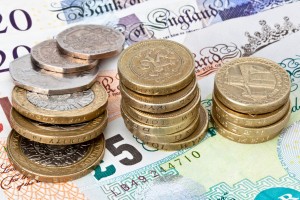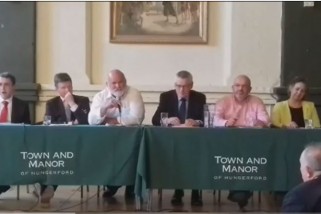This article was prepared for the Newbury Weekly News and a shortened version was published Thursday 1st June 2017, however in the editing has lost clarity so it is presented here in full.
NEWBURY should vote Apolitical to send the message to parliament that we need to take control of the country’s money supply and bring an end to austerity.
David Yates said that a vote for him would highlight a need for economic change, as the common conception of how money works in the banking world “couldn’t be further from the truth.”
Many people going to the polls on 8th June still have an understanding of how money works in the banking industry based on the mutual building society model, or more recently credit unions, where savers deposit small amounts on a weekly or monthly basis to amass a small pot of savings, either for a rainy day, or to build up a deposit so that one day they can get a foot on the property ladder.
In this model, the credit union or building society bundle together peoples’ savings to make loans or issue mortgages, which are repaid over an agreed number of years, and afford the saver a modest return from a share of the interest paid by the borrower.
But in this model, when the loan or mortgage is issued, the money is lost from the building society or credit union for the duration of the loan period. It is assumed that the borrower will spend the money outside of the society or union.
In the case of “the bank”, savers save, borrowers borrow and money is paid back in small amounts over months and years, but this time there is one very big difference. A sum of money is taken out as a mortgage and used to buy a house. The deeds for that house are kept in the vault of the bank as security against the loan, but on the day of the sale the seller puts the money in the bank for safe keeping. In other words the money never leaves “the bank”. The savers, if they look in the banks’ vault to check if their money is safe can see that it is there, the house seller if he wants to see if his money is safe, can see that it is there. But some poor soul now owes the bank a lot of money.
But it doesn’t stop there. “The Bank” confident that the seller of the house doesn’t need all of his money immediately, keep a small proportion in reserve, historically 9%, for the house sellers everyday use, and use the rest to make another loan. The next borrower makes the purchase he needs with the loan, and the seller puts the money back in the bank, for safe keeping.
Now two people owe the bank a lot of money, and everyone who thinks they have money in the bank is able to come along and see their money is safe.
The Banks call this the money-multiplier model, and taken to its conclusion operating a reserve of 9%, it takes only twenty five such transactions to turn ten pounds into a hundred pounds of debt, or a hundred pounds into a thousand, a thousand into ten thousand, a hundred thousand pounds into a million. This is known as Fractional Reserve Banking.
Only companies with a banking licence can operate this sleight of hand, and the only way that the fraud can continue is because the lender of last resort, the Central Bank, in this case The Bank of England, was nationalised in 1947 meaning that the actual lender of last resort is the British Tax Payer.
Mr Yates goes on to explain that; “When Government spending exceeds income from taxation, government is forced to borrow from the banks. The banks use the system described above to create the additional monies out of thin air, and that annual government deficit, is added to the national debt, currently standing at close to two trillion pounds, costing us as a nation £130 million a day in interest.”
Mr Yates and the Apolitical Democrats in agreement with other organisations such as the New Economics Foundation and Positive Money are calling for government to bring an end to the Banks’ strangle hold over our money supply, and Nationalise the Nations Money. Calling on the Treasury to be responsible for putting the nations’ money into circulation, through the pay packets of public sector workers, and that additional money needed for the conduct of business be made available at sustainable rates of interest payable to the nation.
The Apolitical Democrats are further advocating that RBS be taken fully into national ownership, rebranding it as the National Bank of the United Kingdom, and that only money deposited in this new bank be underwritten by the British tax payer. Where currently all deposits up to £75,000 in all banks are being protected by the tax paying public.
“I’m standing in this election to draw attention to the case for monetary reform. If we nationalise our money supply, we can end austerity for ever,” Said Mr Yates.
“By taking control of our money supply, we can afford all the things that we want without the banks syphoning off our wealth: fully funded NHS & Social Care; the very best Education for all our children; decent Wages and Housing; investment in clean Energy; Infrastructure the envy of the world; and Pensions to retire on in dignity.
“Such an initiative would completely remove the hold the banks have over the nation, and would kickstart a productive and fair economy.
Recent governments have at best been in thrall to the banks or at worst in collusion with them. If that is the case, we have been double crossed.
“Every vote for me is a shout out to parliament to listen.”
Mr Yates will be posting a video on the subject at www.apolitical.org.uk soon.












